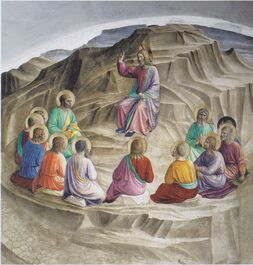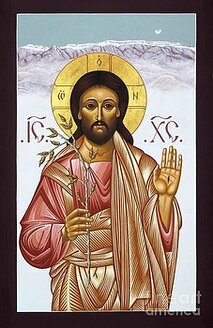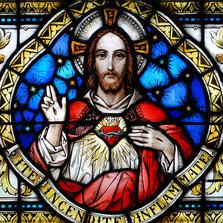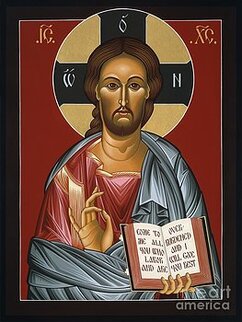 blessed means 'holy' or 'happy' blessed means 'holy' or 'happy' If we were to read only one part of the gospel message of Jesus, it ought to be the Sermon on the Mount. I say this because of how it impressed me the first time I attempted to read the Bible as a teenager. Unfortunately, the only Bible at hand was my mother’s old Douay-Rheims version which was rife with antiquated language. I did follow the narrative, but it was tough going, given the translation. But when I got to Matthew’s Gospel, I was so taken by the Sermon on the Mount (Matthew 5-7) that I hand copied it into a little notebook so that I could read it again and again. I was smitten by the first verses, the Beatitudes. I did not really understand why being meek or mourning would make one blessed, nor did I know that blessed means ‘holy’ or ‘happy,’ but what I did know deep in my heart was that this was the key to being like Jesus since this is what He told us to do. Happily, a few years later I was gifted with a New American Bible which helped tremendously and added to my fascination with those chapters in Matthew. The Beatitudes and the rest of the Sermon became like a gospel within the Gospels. It seemed to me that if we got this right, we would be living as Jesus desires. And within this microcosm of the gospel, just as He taught us to act, He taught us to pray: if we were to only pray one prayer all our lives, it should be the Lord’s Prayer. Together, these two could be enough to meditate upon and to live from. They contain a key to understanding the heart of Jesus and the path to holiness.*  we desire to grow in holiness we desire to grow in holiness Found in Matthew 5:3-12, the Beatitudes are virtuous characteristics which elicit subsequent ‘actions’ that we need to continually work at developing. Each one is an attribute of holiness, and collectively they are characteristics not of the weak, but of the strong. Briefly, to be poor in spirit means that we are humble before God and in recognizing our need for Him, we desire to grow in holiness and actively seek Him; to be meek is to be humble such that we know who we are before God and therefore serve Him by serving others; to mourn is about lamenting evil, injustice, suffering, and the effects of sin, (ours and that of the world), and then to work against these evils; to hunger and thirst for righteousness is about desiring justice, thus becoming more just in our actions; to be merciful is about seeking and receiving God’s mercy such that our own hearts are moved to mercy toward others; to be clean of heart is to desire purity in word and deed, cultivating a heart that only seeks to do the will of God; to be a peacemaker is to recognize how much we have been forgiven and consequently forgive others, to let go of anything we desire to possess in order to grow in interior freedom, bringing a calming presence to those we are with. Finally, to rejoice when we are insulted is not to seek injury, but to realize the depth of our love and to live it such that if the occasion arises we are willing to suffer for the sake of the Kingdom. If these sound impossible, that is because to have them all would mean we are perfect, and of course, we are not. But we can grow in each of them so as to be happier and holier, which ultimately means, to be truly free.  our daily bread our daily bread To live as a ‘child of the Beatitudes’ we do not need any extraordinary gifts, talents, or to be in spectacular situations. All we need to attain them is found within the Sermon on the Mount, the gospel within the Gospels, especially when Jesus taught His disciples (us) how to pray. (Matthew 6:9-14) He wanted us to recognize God as the Holiest of Holies who, rather than being inaccessible, is our Father, our Abba (Daddy), whom He says to freely and lovingly address with intimacy. We are to offer ourselves to Him such that we desire His will to be done not only by ourselves, but to be done in the world, ultimately desiring His Kingdom to be fulfilled. We beg humbly for what we need to do His will, our daily bread: the Eucharist and all the graces needed this day, especially the grace to forgive as He does because we, too, need forgiveness,** and that we would not be tested beyond our strength by the evil one, but rather that He would strengthen and preserve us from the enemy’s power and sway. Thus, this prayer contains everything necessary to growing in intimacy with God.  reflect on the gospel within the Gospels reflect on the gospel within the Gospels In short, the Sermon on the Mount, especially the Beatitudes and the Lord’s Prayer, contains the heart of what it means to be Christian, a disciple of Jesus Christ who desires to be merciful as He is merciful, loving as He is loving, and humble as He is humble. To be this way is to have the strength that comes from faith and trust in Jesus. While all of the Gospels are beautiful and incredibly important, I believe that if we were to read only one, and within that, only one part of the Gospel, it should be the Sermon on the Mount. Pray with it, reflect upon it, and chew on it continuously: it is the heart and soul of Jesus’ teaching, thereby revealing Who God is.  may we know Jesus better may we know Jesus better May we give thanks to have been given the Sermon on the Mount, the gospel within the Gospels! May we learn more each day about how to live the Beatitudes and put them into action! And may we seek to grow in prayer so that we may know Jesus better and grow ever closer to God! Let us meet in the Heart of Jesus! Peace! ©Michele L. Catanese † In loving memory of David Coupar, a dear friend and probably the most devoted reader and ‘sharer’ of this blog over the years. He never failed to make a kind, encouraging comment. May he rest in peace! *To be clear, the Sermon on the Mount also appears in Luke’s Gospel, but he sets it on a plain, rather than a mountain so as not to cast fear into his Greek audience who feared the thought of gods on mountains. Luke’s version is wonderful also, but for the sake of this entry, I only mention Matthew’s account. **Elsewhere in the Sermon, Jesus said to take the plank out of our own eye before attempting to take a splinter out of someone else’s eye, so clearly He is teaching that forgiveness entails becoming humble enough to recognize the greatness of the mercy we have received and then to extend it to others who may have wronged us. (Matthew 7:3-4) Final note: I would add to this a suggestion that we also meditate on the Fruits of the Spirit which St. Paul lists in his letter to the Galatians (5:22-23): love, joy, peace, patience, kindness, generosity, faithfulness, gentleness, and self-control. These are all virtuous actions we want to be present within us so that they, too, ‘grow us’ into holiness. If we become alive in the Spirit, that is, if we become intimate with the Holy Spirit through our prayer and desire to live out the Beatitudes, we will be bearers of the Holy Spirit made apparent through those fruits. Images: 1. My photo, Bible. 2. Fresco Painting, Sermon on the Mount, by Blessed Fra Angelico. 3. Painting, Still Life with Bottle, Carafe, Bread and Wine, by Claude Monet (1862-63) For more on this painting, www.nga.gov/collection/art-object-page.164942.html 4. My photo, Luminous Trees, taken outside of Schulenburg, Texas 5. Icon, Nuestro Salvador de las Sandias, by Fr. William Hart McNichols. To purchase a copy in one of many mediums, go to fineartamerica.com/featured/nuestro-salvador-de-las-sandias-012-william-hart-mcnichols.html Note: In compliance with GDPR rules, I wish to make it clear that I do not gather any information on any of my readers at any time.  God's limitless care and mercy God's limitless care and mercy Sometimes it takes a challenge to recognize an area in need of growth. Recently I was working on something in which a last minute glitch took place, creating a substantial bit of stress. I prayed for a resolution, but after a few hours of still feeling anxious about it, I realized my trust in God wasn’t what it should have been: although I asked the Lord for help, it was as if I did not really believe He would. I thought I trusted God, but my worrying and ‘stressed-out’ spirit was a red-flag indicating that my trust was coming up short. In truth, it is easy to trust in God when everything is going smoothly, but even with the best of intentions, when things get tough trusting is far more of a challenge. It is often difficult to trust in the midst of that which is out of our control, but unlike the apostles on the Sea of Galilee, we must be aware that the Lord is riding out the storm with us. Therefore, it is important to examine whether we believe that God truly remains present no matter the outcome. And if the outcome does involve greater challenge, we need to understand that though difficult, suffering might be the path on which He accompanies us, our way to holiness. It is important to our life of faith that we be attentive to our level of trust so that in times of trouble we can better rely on God’s limitless care and mercy. The good news is that no matter how we might feel in a given moment, the Sacred Heart of Jesus is always open to us.  do you not yet have faith? do you not yet have faith? All three synoptic gospels recount the story of Jesus calming a storm at sea.* While Jesus and the apostles were crossing the Sea of Galilee a fierce storm blew up. The apostles panicked while Jesus slept, so they awakened Him saying, “Do you not care that we are perishing?” Jesus rebuked the storm, and then asked them, “Do you not yet have faith?” This demonstrates how easy it is to lose trust and faith in the Lord when chaos ensues. A second storm at sea is recorded in the Gospels of Matthew, Mark, and John, only this time the terrified apostles see Jesus walk across the water and approach the boat, identifying Himself as “I Am,” something totally lost on them. (Mark 6:50)** Only Peter had a moment of courageous trust, (or impulsiveness); he got out of the boat, walking on the water until his faith wavered as if he suddenly remembered that walking on water is ‘impossible.’ Thus, Peter sank and Jesus (lovingly) challenged him: “O you of little faith, why did you doubt?” (Matthew 14:31)  with Him, we can withstand all things with Him, we can withstand all things It is important to consider whether we are like those apostles, thinking we will perish when we get ‘storm-tossed.’ Jesus said that if we told a mountain to throw itself into the sea “it would be done.” He continued: “All that you ask for in prayer, believe that you will receive it and it shall be yours.”(Mark 11: 23-25) Do we really believe these promises? Surely Jesus would not say something like this if He did not mean it; speaking any untruth is impossible for Him since He is the Truth. (John 14:6) While Jesus used some hyperbole,*** He certainly meant that if we have belief and trust, He will follow through. Of course, God is not like the proverbial genie in a bottle who grants wishes, but rather, when something is needed to give strength, aid growth in faith, help a loved one be healed, or build the Kingdom, we should pray with trust that God will do it. In prayer, if we offer Him our fear as the only gift we can give at that moment, He will fill the space created by our gift with the peace only He can give. But if we do not truly give Him the fear, there is no room for the peace. Jesus has command over chaos and whatever storms rock our world. Therefore, we can hand God all our troubles, cares, difficulties, and challenges, trusting that with Him, we can withstand all things; His is the victory, and so together we will prevail.  His mercy is endless His mercy is endless Jesus did not promise a trouble-free life, but through His mercy we have been left with many spiritual resources offered through the Holy Spirit. We meet Him in the Sacraments and in prayer: the best way to cultivate trust and faith, and to develop our relationship with Jesus, is through these. If we do not speak with Him or develop our friendship with Him, it will be difficult to turn to Him or to trust in what He promises. Prayerful reflection on the Gospels reveals the heart of Jesus; to see how God’s power works, look to the early Church as described in the Acts of the Apostles; to see what grace can do, look to the lives of the Saints who trusted God so completely that they gave their all for Him. Adoration and worship, private prayer and study are all pathways to deeper trust, lively faith, and holiness. No one is perfect, and none of us will ever be perfect in our trust, but we can work at it with the help of grace. In this month of celebrating the Sacred Heart of Jesus, let us trust that His heart is wide, His mercy endless, and that there is much room in it for everything we bring.  may we ask for the graces of courage and trust may we ask for the graces of courage and trust May we join our hearts to the Sacred Heart of Jesus! May we ask the Holy Spirit for the graces of courage and trust, especially when we are most challenged! May we bear witness to the trust that comes from intimacy with God through prayer! And may we be like the apostles and holy ones who learned to put all their trust in God! Let us meet in the Sacred Heart of Jesus! ©Michele L. Catanese * Mark, Matthew, and Luke are the synoptic gospels. This designation refers to the fact that they share a common outline, as written (first) by Mark. While they do contain some of the same stories, there is also much that is unique to each gospel. ** It is notable that Luke omits this story, but John includes it. John only repeats two miracles that appear in the other gospels and that is the feeding of 5000 and Jesus walking on water. The three who wrote of the walking on water emphasize that Jesus is I AM, that is, God, when they report Jesus saying, “It is I. Do not be afraid.” But the apostles were so frightened that they failed to catch the reference. Here are the passages if you wish to compare the stories: Calming of the Sea: Matthew 8:23-27, Mark 4:35-41, Luke 8:22-25 Walking on Water: Matthew 14:22-33, Mark 6:45-52, John 6:16-21 *** Hyperbole is a Jewish teaching tool that was customarily used to make a point that was not to be missed. It is a not-so-subtle exaggeration. Images: 1. My photo; stained glass, Sacred Heart of Jesus. 2. Painting, Jesus Calming the Storm from Pictorial Bible of Abbey of St. Bertin French (St. Omer), 1190-1200, The Hague, Koninklijk Bibliotheek 3. Painting, Approaching Storm, Dog Point, Summer 2014, by Tom Thompson 4. Icon, Christ All Merciful, by Fr. William Hart McNichols. You can find this icon at fineartamerica.com/featured/christ-all-merciful-022-william-hart-mcnichols.html 5. Painting, Evening 1907, by Childe Hassam Note: In compliance with GDPR rules, I wish to make it clear that I do not gather any information on any of my readers at any time. |
Heart Speaks to Heart
|

 RSS Feed
RSS Feed

